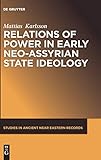Relations of Power in Early Neo-Assyrian State Ideology / Mattias Karlsson.
Material type: TextSeries: Studies in Ancient Near Eastern Records (SANER) ; 10Publisher: Berlin ; Boston : De Gruyter, [2016]Copyright date: ©2016Description: 1 online resource (XIV, 507 p.)Content type:
TextSeries: Studies in Ancient Near Eastern Records (SANER) ; 10Publisher: Berlin ; Boston : De Gruyter, [2016]Copyright date: ©2016Description: 1 online resource (XIV, 507 p.)Content type: - 9781614517443
- 9781614519683
- 9781614516910
- Gods -- Political aspects -- Assyria -- History -- Sources
- Gods -- Political aspects -- Assyria -- History -- Sources
- Ideology -- Political aspects -- Assyria -- History -- Sources
- Ideology -- Political aspects -- Assyria -- History -- Sources
- Imperialism -- History -- To 1500 -- Sources
- Imperialism -- History -- To 1500 -- Sources
- Power (Social sciences) -- Assyria -- History -- Sources
- Power (Social sciences) -- Assyria -- History -- Sources
- Ashurnasirpal II
- Neo-Assyrian
- Shalmaneser III
- propaganda
- HISTORY / Ancient / General
- Ashurnasirpal II
- Neo-Assyrian
- Shalmaneser III
- propaganda
- DS73.7
- online - DeGruyter
- Issued also in print.
| Item type | Current library | Call number | URL | Status | Notes | Barcode | |
|---|---|---|---|---|---|---|---|
 eBook
eBook
|
Biblioteca "Angelicum" Pont. Univ. S.Tommaso d'Aquino Nuvola online | online - DeGruyter (Browse shelf(Opens below)) | Online access | Not for loan (Accesso limitato) | Accesso per gli utenti autorizzati / Access for authorized users | (dgr)9781614516910 |
Frontmatter -- Preface -- Contents -- List of figures -- Abbreviations -- 1. Introduction -- 2. The primary sources of the study -- 3. The relationship between the great gods and the foreign lands -- 4. The relationship between the great gods and the king of Assyria -- 5. The relationship between the king of Assyria and the foreign lands -- 6. Ideological development within the reigns -- 7. Local propaganda and regional politics -- 8. Ideological comparison between the reigns -- 9. The development of Assyrian state ideology -- 10. Conclusion of the study -- Bibliography -- Figures -- Appendices and indices
restricted access online access with authorization star
http://purl.org/coar/access_right/c_16ec
This volume examines the state ideology of Assyria in the Early Neo-Assyrian period (934-745 BCE) focusing on how power relations between the Mesopotamian deities, the Assyrian king, and foreign lands are described and depicted. It undertakes a close reading of delimited royal inscriptions and iconography making use of postcolonial and gender theory, and addresses such topics as royal deification, “religious imperialism”, ethnicity and empire, and gendered imagery. The important contribution of this study lies especially in its identification of patterns of ideological continuity and variation within the reigns of individual rulers, between various localities, and between the different rulers of this period, and in its discussion of the place of Early Neo-Assyrian state ideology in the overall development of Assyrian propaganda. It includes several indexed appendices, which list all primary sources, present all divine and royal epithets, and provide all of the “royal visual representations,” and incorporates numerous illustrations, such as maps, plans, and royal iconography.
Issued also in print.
Mode of access: Internet via World Wide Web.
In English.
Description based on online resource; title from PDF title page (publisher's Web site, viewed 28. Feb 2023)


